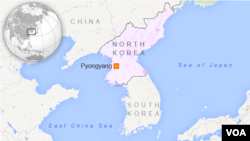Beijing is pushing back on Seoul's demand that China stop repatriating North Koreans who have left their homeland and been detained as they attempt to make their way to a third country.
China is detaining as many as 2,000 North Korean defectors who face severe punishment for fleeing the repressive Kim regime, South Korean Unification Minister Kim Yung Ho said Wednesday at a seminar in Seoul.
Elizabeth Salmon, the U.N. special rapporteur on North Korea's human rights, estimated the number of North Korean defectors in China as of 2022 that the South Korean minister used.
China considers North Koreans entering its country to be illegal immigrants rather than refugees and arrests them when they are caught, then sends them back to North Korea, which treats them as traitors.
Human rights advocates expect China to repatriate those detained when the China-North Korea border fully reopens after being locked down during the COVID-19 pandemic.
"We ask cooperation from the Chinese government on the issue of North Korean defectors detained in China [subject to] forcible repatriation" to North Korea, Kim Yung Ho said.
China has an "obligation to abide by international norms prohibiting forced repatriation," Kim continued, adding, "The South Korean government will accept all defectors who wish to come to South Korea."
China, North Korea becoming closer
South Korea's call for China to stop sending back North Korean defectors came two days ahead of a historic trilateral summit that Washington hosted for Seoul and Tokyo at Camp David on Friday. Beijing said it opposed the gathering of leaders of the three countries.
Liu Pengyu, a spokesperson for the Chinese Embassy in Washington, on Thursday told VOA's Korean Service, "The Chinese government has all along handled issues related to the DPRK people illegally entering into China in keeping with Chinese laws, international law and humanitarianism."
The official name of North Korea is the Democratic People's Republic of Korea.
China ratified the 1951 Refugee Convention and its 1967 Protocol in 1982 and is obligated to follow the convention's core principle of nonrefoulment. That is a principle of international law that forbids a country receiving asylum-seekers from returning them to a country in which they would be in probable danger.
Ties between China and North Korea are becoming closer as tensions between Beijing and Washington increase. The two Asian nations agreed to increase cooperation when a Chinese delegation visited Pyongyang in July as the allies marked the 70th anniversary of the end of the Korean War of 1951-53.
South Korea's Kim said China must designate North Korean defectors as refugees who have the right to receive protection rather than as illegal immigrants.
He added that the human rights of North Korean defectors in China should be guaranteed according to international norms and that the North Koreans in China should be allowed to go to a country of their choosing such as South Korea.
Robert King, who served as the U.S. special envoy for North Korea's human rights under the Obama administration, said, "The Chinese are cooperating with the North Koreans on the human rights abuses."
He continued, "I commend the South Korean government for making the issue and for raising the problem."
New focus on human rights
Seoul has been raising human rights issues since President Yoon Suk Yeol took office in May 2022.
The previous administration of Moon Jae-in shunned the issue to avoid upsetting Pyongyang and Beijing. Moon, a former human rights attorney, wanted to improve inter-Korean relations with China's support.
Roberta Cohen, who served as deputy assistant secretary of state for human rights during the Carter administration, said Beijing should examine "whether China is complicating its relations with South Korea by forcibly repatriating North Koreans trying to reach Seoul," as they are "beaten up, tortured, subject to forced labor, detention and possibly execution in the DPRK" when they are repatriated.
She continued, "South Korea can hardly remain silent when it is the country most affected by the forced repatriations of North Koreans."
In the first open U.N. Security Council meeting on North Korea's human rights in six years, South Korea's U.N. Ambassador Hwang Joon-kook on Thursday condemned North Korea's human rights abuses.
He said human rights abuses are a "critical national security issue" for South Korea as Pyongyang represses its people to develop nuclear and missile programs that threaten South Koreans.
Kim Hyungjin contributed to this report.




